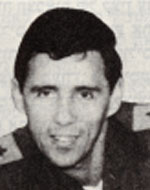Aharon (Johnny), son of Dvora and Chaim Tenenbaum, was born on September 18, 1940 in Poland, immigrated to Israel in 1950 and completed his studies at the Brenner elementary school and at the high school “Katznelson” in Kfar Saba Aharon was drafted into the IDF in mid-August 1958 and since then has served in the Engineering Corps. He successfully completed many courses: a parachuting course, an engineering officer course, which he completed as an outstanding trainee, a company commanders course, and a small combat course. Thanks to his qualifications, he rose to the ranks and filled various positions of an officer in the career army – field command positions, training positions in the Corps Corps engineering school and staff positions. Aharon filled all the positions, from the platoon commander to the commander of command engineering of the Southern Command. Between 1964-1961 he was in Ethiopia, on behalf of the Ministry of Defense. In the Six Day War, Aharon commanded a brigade engineering company and participated in the fierce battles in the Dotan Valley in Samaria. He volunteered for a difficult and dangerous task of rescuing casualties. Three times his armored half-track was hit when he went out to rescue infantry and armored personnel carriers, who had been hit by Jordanian fire on the Kabatiya ridges. Aharon performed this task until the end, until all the casualties were evacuated. The commander of the Northern Command, Maj. Gen. David Elazar, was awarded the “Medal of Honor” by the Commander of the Northern Command, and after the Six-Day War, Aharon was appointed battalion commander in Sinai, where he was responsible for erecting fortifications. At the end of his position, his battalion received special appreciation from the division commander for “ability, dedication and ability to carry out their work at the Sinai front.” During his military service, Aharon did not abandon his studies and completed his bachelor’s degree in sociology and political science at Tel Aviv University. He was preparing to study for a master’s degree in business administration, but he agreed to give up his studies, in order to get a senior position – the commander of the Southern Command’s engineering corps, and in that role he served in the Yom Kippur War. He was an officer in the career army with the rank of lieutenant colonel who saw his home and his mission in the IDF, and especially in the Engineering Corps, as an outstanding combatant, an outstanding commander, a leader and a model for his men. Johnny, was one of the senior IDF officers who fell in the Yom Kippur War. He is named after the bridge “Johnny,” one of the bridges, which he founded on the Suez Canal. He devoted his holidays and the few leisure hours of a career officer in combat units to his wife, his little son and daughter. At every moment of leisure, he would go to his family in Be’er Sheva or to his father in Kfar Saba, to which Aharon was very attached after the death of his mother. In the period before the Yom Kippur War, Aaron devoted much thought to the development of mediation and success. He developed new means, including bridges, guided and trained units of bridging and bridging, and worked out methods and procedures to prepare his units for the day they were forced to cross the Sinai water barrier – the Suez Canal. Immediately after the outbreak of the war, he joined the headquarters of Major General Sharon’s division as head of the mediation and success. During the war, Aharon ordered the construction of the first bridge of success on the canal, the bridge bridge. The days of the construction of the bridge were the climax of the military career of this courageous officer: under heavy and relentless artillery fire by the Egyptians, who tried to prevent the construction of the bridges while rescuing the wounded, encouraging soldiers and clearing minefields and other obstacles, Aharon conducted the most complicated operation, He was an example of his soldiers in his coolness, his control of people and equipment, his courage and his professional knowledge, and the engineering commander, who was so loved by his soldiers, did not see the successful end of the engineering operation he was entrusted with – leaving all the bridges on the canal. And was killed on one of the bridges on the 22nd of Tishrei, 5734(18.10.1973) and was brought to rest in the military cemetery in Be’er Sheva. He left behind a wife, a son and a daughter, a father and a sister.
